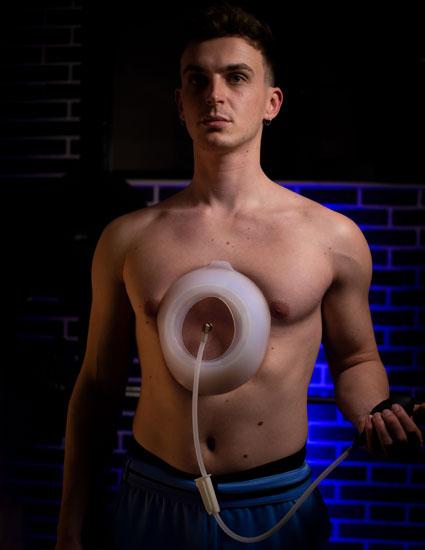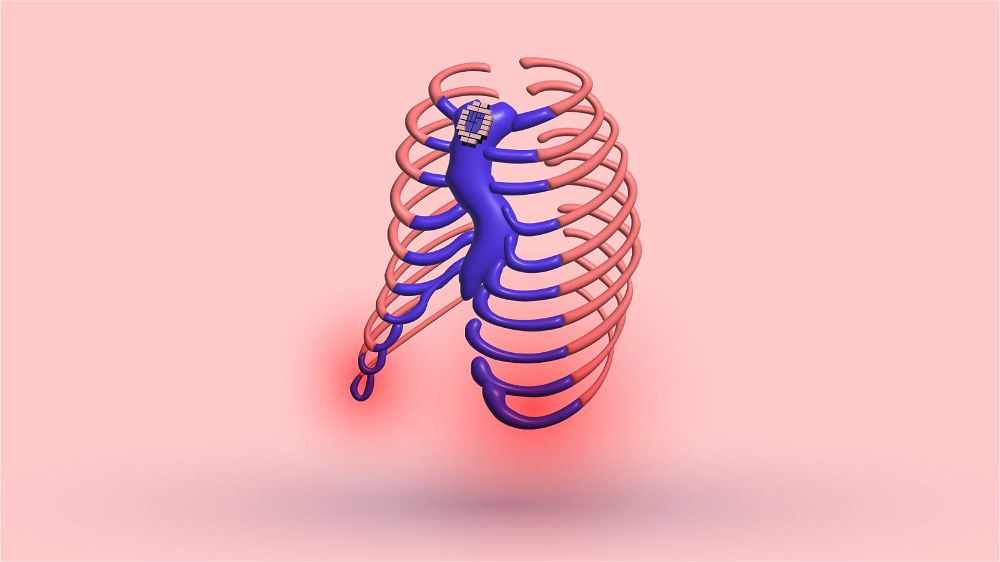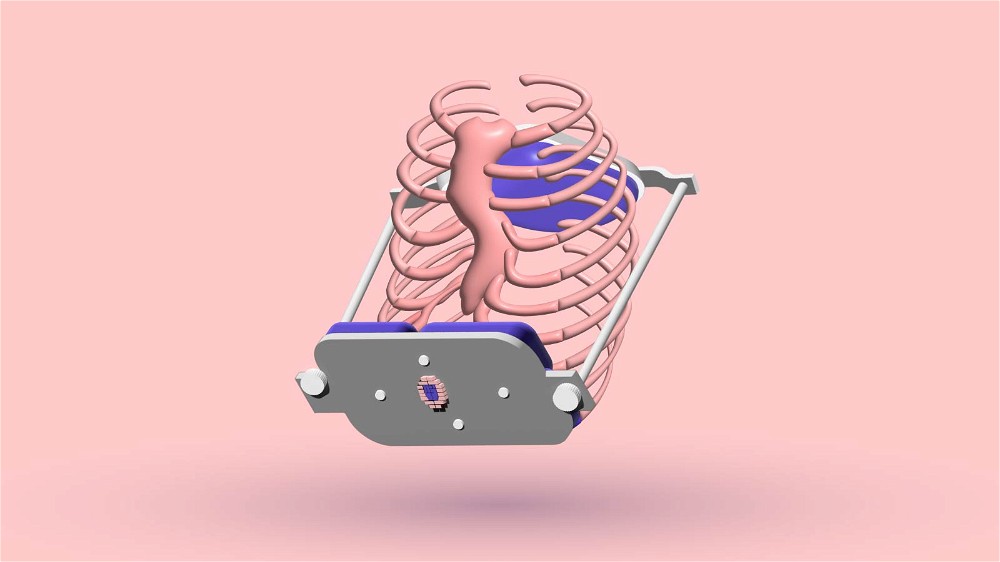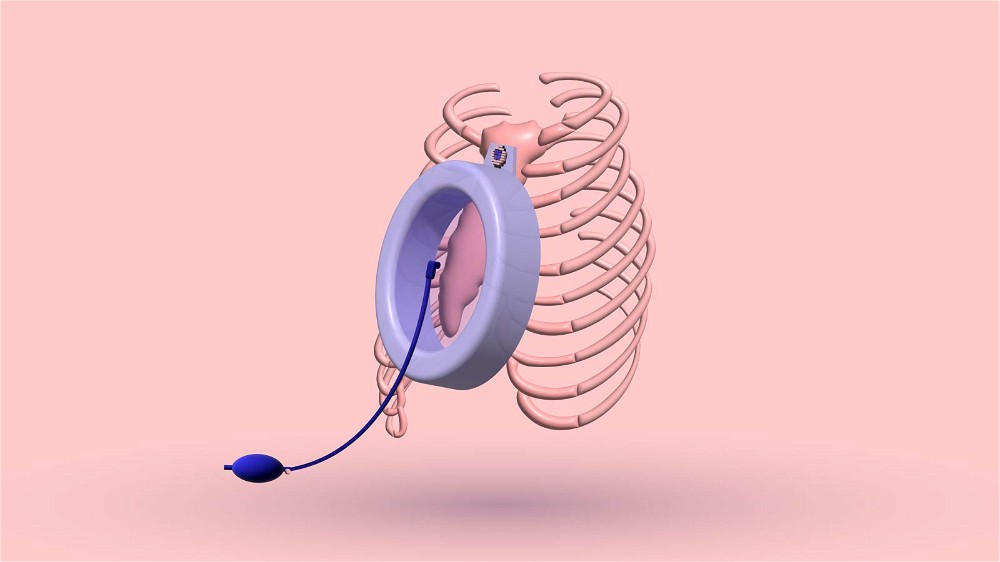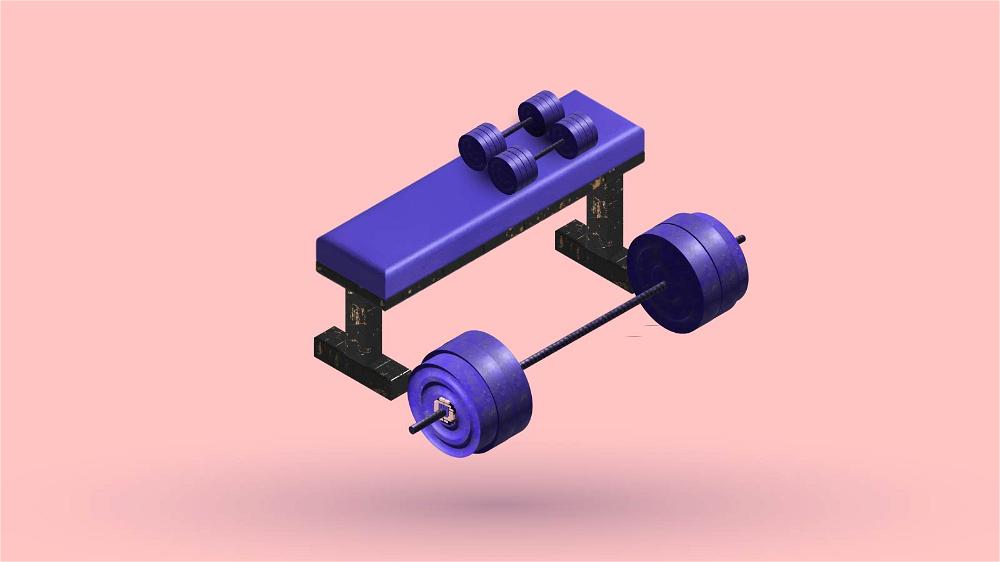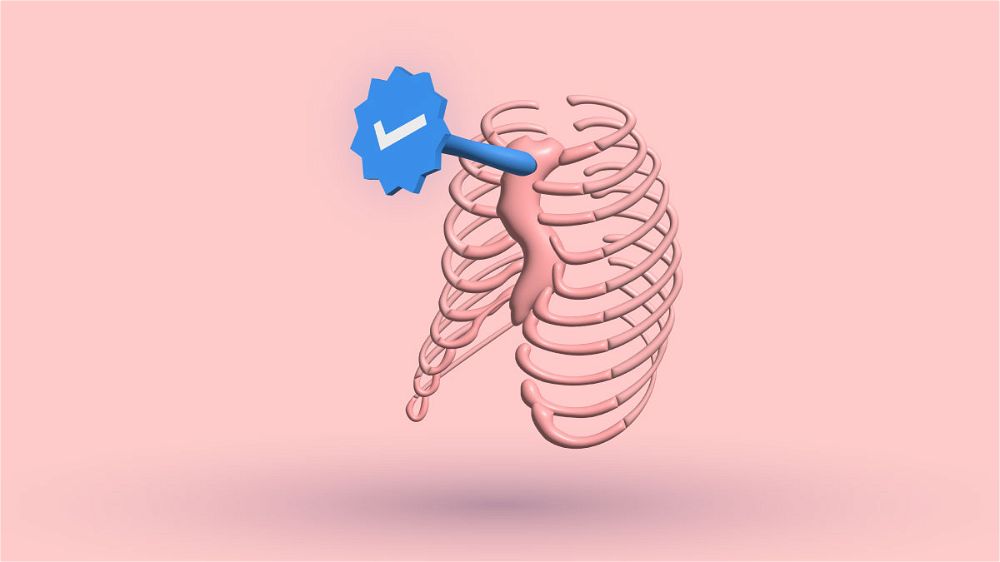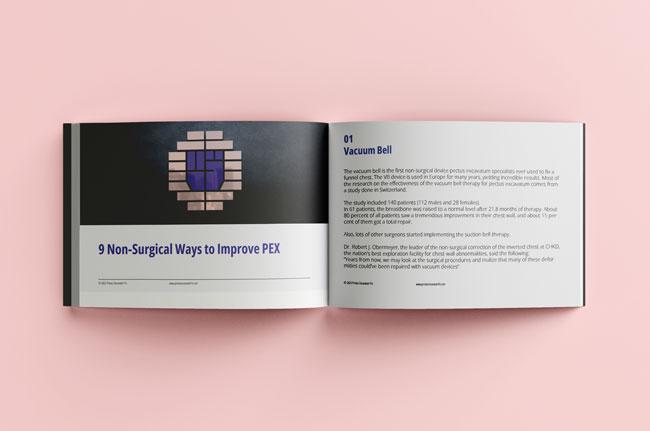According to the World Health Organization, Coronaviruses are an extended family of viruses that can cause disease in humans and animals.
The most recently discovered coronavirus is COVID-19. It causes respiratory infections, which can negatively affect people with pectus excavatum deformity, who have reduced lung capacity and are prone to pulmonary diseases.
The infection caused by COVID-19 can be a common cold, pneumonia, to severe respiratory diseases like MARS and SARS. COVID-19 was undiscovered until the Wuhan, China epidemic in late 2019. I will show you a few studies, doctor's tips, and experiences of people with sunken chests who had the coronavirus.
Keep in mind that COVID-19 is a new disease, so doctors and scientists can't give a definite answer yet on how it affects people with pectus excavatum differently than people with regular-shaped chests.
2021 STUDY
A 2021 study concluded that the COVID-19 disease affects the respiratory system of sufferers. If the patient has other comorbidities such as pectus excavatum, the altercation with the lung functioning can be fatal.
Because of this, it should be essential to create specific management protocols for the clinical improvement of patients with pectus excavatum. This is the only study, as of July 2022, about pectus excavatum and COVID-19.
10 EARLY SYMPTOMS

According to WHO (World Health Organization), symptoms of COVID-19 are:
- High fever
- Physical exhaustion
- Dry and frequent cough
- Difficulty breathing or shortness of breath
- Chest pains
- Stuffy nose
- Runny nose
- Sore throat
- Diarrhea
- Loss of taste or smell
The symptoms are moderate at the start but can progress steadily. Some people become infected but don't have any signs of the disease.
Click the following link to learn about the essential defensive measures against the new coronavirus. The same rules apply to pectus excavatum patients.
HOW SERIOUS IS IT?

According to World Health Organization, one in six people become critically sick and develop shortness of breath because of the coronavirus. As a person with pectus excavatum, this can seem scary. Generally, we already have reduced lung capacity.
The breathing difficulties caused by the COVID-19 disease and the shortness of breath can put your life at risk. It is not only the elderly, but people with underlying health conditions are also prone to developing a significant illness.
HOW COVID-19 AFFECTS PECTUS EXCAVATUM

To all people worrying and asking how COVID-19 will affect a patient's lung functioning, this post by Business Insider will be helpful. In the research, doctors discuss how the coronavirus affects the lungs. If a sufferer gets the virus and manages to recover, it will reduce 20% to 30% of the total lung capacity.
If you didn't know, research proves that patients with pectus excavatum already have a lower lung capacity than healthy people. I will list a few scientific articles that prove this below. I've heard multiple doctors say the coronavirus will affect people with constrained lungs.
The studies demonstrate that these are people with asthma and pectus excavatum sufferers.
DECREASED LUNG CAPACITY AND COVID-19
Shortness of breath and exercise intolerance has been related to pectus excavatum from the start. A study published in 2007, led by Robert Edward Kelly Jr., involved 11 North American medical centers.
It was discovered that 65% of all patients with pectus excavatum complained of breathing difficulties while doing physical activity. A similar percentage of the patients also reported exercise intolerance.
Research published in 2016 by Donald Nuss, Robert E. Kelly, and Robert Obermeyer concluded that pectus excavatum in most patients decreases their pulmonary function (lung capacity).
They also discovered that pulmonary function is improved when the deformity is repaired with a Nuss procedure. Similar findings were reported in a 2005 study.
Researchers concluded that pectus excavatum patients have lower lung functionality than regular patients. After the Nuss procedure and Pectus bar removal, the lung capacity in the patients improved.
This proves that when the pectus excavatum deformity is corrected, the lung capacity returns to normal. There are a few other scientific articles that prove this point.
I don’t want you to panic. I am trying to convince you that people with pectus excavatum should take COVID-19 more seriously and be categorized as high-risk.
I am surprised how doctors don’t inform their patients with severe pectus excavatum that they are in the High-Risk category. The scientific evidence is here.
Please follow the instructions of WHO. If your deformity is severe, your heart and lungs can have trouble dealing with the virus. You know your body better than everyone.
In my opinion, many people aren’t taking pectus excavatum problems seriously. It is not worth the risk of getting a COVID-19 infection.
PLEASE DON'T PANIC
I don't want you to panic. I am trying to inform you that people with pectus excavatum should take COVID-19 more seriously and be categorized as high-risk.
I am surprised how doctors don't inform their patients with severe pectus excavatum that they are in the High-Risk category. The scientific evidence is here.
Please follow the instructions of WHO. If your deformity is severe, your heart and lungs can have trouble dealing with the disease.
You know your body better than everyone. In my opinion, many people aren't taking pectus excavatum problems seriously. It is not worth the risk of getting a COVID-19 infection.
DON'T UNDERESTIMATE THE CORONAVIRUS
Please don't underestimate the disease. At the pandemic's peak, doctors in Italy said COVID-19 was very aggressive, attacking the strong and healthy. COVID-19 is extremely dangerous and is destroying the medical systems of one of the most sophisticated countries in the world.
TELL YOUR KIDS TO WEAR MASKS
Kids born with severe pectus excavatum can have a weak immune system and breathe very fast, loudly, and heavily. You must tell your kids to wear a mask whenever they go out.
The virus is far more deadly than people first initially thought. Even if your deformity is corrected, but you have Marfan Syndrome, you are still at high risk because it restricts the lungs.
WHAT DOCTORS HAVE TO SAY

I've collected information about a few worried patients on Facebook groups related to pectus excavatum. They asked the doctors how to deal with the new coronavirus.
KID WITH SEVERE PECTUS EXCAVATUM & ASTHMA
A parent of a kid with a severe pectus excavatum has asthma, pneumonia, and respiratory syncytial virus. He says his kid is continually getting sick, and when he gets sick, it hits him hard.
His primary care physician and pulmonologist suggested keeping him confined as much as possible. He is at high risk and very vulnerable to the novel coronavirus. Don't take any chances with your kids. They need to be self-isolating.
52-YEAR-OLD EMPLOYEE EXPERIENCE
An older gentleman aged 52 has severe pectus excavatum and gets out of breath quickly, especially at night. However, his employer only lets him work from home because he has asthma.
He says you must still go to work if you only suffer from pectus excavatum. The employers usually need something official to allow them to be off for 12 weeks.
Leave things to no chance. Tell your employers you have pectus excavatum. If they're unfamiliar with it, explain it to them shortly.
Show them the scientific studies I mentioned above and clarify why you should be considered in the high-risk group. It would be good if pectus excavatum could be formally recognized as a respiratory condition.
THE PARENT IS AT RISK OF BEING INFECTED
A parent with severe pectus excavatum compromised lung capacity, and breathlessness is scared of his teenage boys returning and going to school. Even though he doesn't go to work, he is still prone to catching the new coronavirus.
53-YEAR-OLD GENTLEMAN WITH PECTUS SURVIVED CORONA
Another person who, at the time of this writing, is 55 years old with a moderate deformity had the Coronavirus in February 2020. He said that his breathing was difficult.
Thankfully, he survived. Many people with pectus excavatum have also messaged me that doctors didn't give them any advice about the disease because they don't know enough about it.
In most patients, only the family doctor tells them they have pectus excavatum. They aren't referred to a different doctor. With time, the deformity can worsen, and you can get breathless at work if you do a physical job.
PECTUS EXCAVATUM IS IN THE HIGH-RISK CATEGORY
The Marfan Syndrome Foundation categorizes pectus excavatum patients as high-risk. I got this information from the Marfan Foundation, which I have found to be very clear and straight to the point. This suggests that patients with pectus excavatum are at high risk.
Question: Do Pectus excavatum and scoliosis cause restrictive lung disease in certain instances. If you had it corrected, is restrictive lung disease gone? #CV19Marfan
— TheMarfanFoundation (@MarfanFdn) March 12, 2020
If you have pectus or scoliosis, you likely have some measure of restriction that will persist. You are likely in the high-risk category b/c there is still some restriction. #CV19Marfan
— TheMarfanFoundation (@MarfanFdn) March 12, 2020
IF YOU FEEL SYMPTOMS

Doctors do not accept patients who have not called ahead for COVID screening first in many states in the U.S. Many people are going straight to the doctors without calling for COVID screening.
This puts others at risk. Call your local COVID-19 screening team. They will examine your symptoms by calling you on the phone and informing you about self-treatment alternatives.
Don't go anywhere without the COVID screening team telling you to. Please, stay isolated at home. Your local hospital can also help you connect with this team. You will be fine. Don't worry.
CALL AN AMBULANCE IF YOU DON'T FEEL WELL
Call an ambulance immediately if you get extreme shortness of breath (it can happen a few days after you feel the first symptoms). Relax through it, and peacefully wait until your results come.
You may not even have COVID-19 at all. Meanwhile, stay hydrated, stretch, do light exercises in your house, and eat your favorite healthy foods. It would be best if you stayed safe.
CONTACT ME IF YOU NEED ANY MENTAL SUPPORT
Feel free to contact me if you need to talk to somebody about COVID-19 and pectus excavatum. Any preexisting lung condition and respiratory system infection have a chance to become problematic.
PLEASE DISINFECT YOUR HANDS
If one of your family members has pectus excavatum, please disinfect yourself if you've been outside before stepping indoors.
LITTLE IS KNOWN ABOUT COVID-19

If you recently underwent surgery to fix your pectus excavatum deformity, please call your surgeon and ask about COVID-19. I've also searched in all Pectus forums about experiences with the COVID virus and decided to share them with you.
If you live with someone, please explain your situation and politely ask them to be the designated person to go out and buy food and medications.
If you're living alone, please wear a mask when you go out and stay away from touching your mouth, nose, and eyes. That will significantly reduce the risk.
HOW TO STAY RELAXED

If you're feeling anxious, try to keep yourself busy. Do daily meditation, exercise, find a new hobby, clean your entire house, reconnect with your old friends, and, most importantly, follow the World Health Organization's standards to stay healthy.
It is perfectly normal to feel overly anxious about COVID-19, especially if you suffer from reduced lung capacity caused by your pectus excavatum condition.
If you're anxious, your breathing will be more strained than usual. Try not to focus on COVID-19. Don't watch the news all day. That increases your stress levels, especially during a worldwide pandemic. However, keep in mind that the pandemic is severe. I noticed that I was stressed out too.
I found yoga breathing and meditation to be beneficial in calming my nervousness. I mainly focus on breathing deep in my stomach and ribs. After each session, I feel calm and relaxed. Try this. It will make your life a lot easier during these stressful times that we live in.
I wouldn't expect any doctor to call you individually and warn you about the coronavirus. They all expect us to follow the guidelines of the World Health Organization we've all been given. Additionally, most pediatricians don't think pectus excavatum affects your child's health.
If the coronavirus is symptomatic, it makes you cough a lot. If you already have pectus excavatum, expect to feel a sharp pain in your chest.
NUSS PROCEDURE AND COVID-19
The Covid-19 disease can be hazardous if you recently underwent a pectus excavatum surgery (Nuss or Ravitch procedure). After surgery, lung functionality is decreased.
Generally, the lungs work only about 50% post-surgically. It can be hazardous if you contract the COVID-19 virus during this period.
POSTPONE THE SURGERIES

If you have a respiratory infection after a Nuss or Ravitch procedure, expect to feel like your chest is being ripped open every time you cough. This happened to many patients, even a year after the initial surgery. Postoperatively, you'll be going in and out of hospitals for regular check-ups.
That will increase the chances of getting infected by the coronavirus disease, resulting in frequent dry coughs that will be extremely painful. You wouldn't want to increase the chance of something that will make you repeatedly cough.
The surgeon's office will probably be overwhelmed by people asking for help with the coronavirus disease. You will run into follow-up problems. It will be hard to schedule an appointment or ask a question unrelated to the coronavirus.
The government asked for all elective procedures to be postponed during a press conference in the White House. U.S. Surgeon General Jerome Adams requested this. The point is that the medical systems in almost all countries globally were exhausted by the coronavirus disease.
A clear example of this was Italy, Spain, and Brazil. All medical workers and resources were directed toward dealing with COVID-19. Even "non-elective" surgeries were put at risk. There was a shortage of beds in the intensive care unit in Italy.
IS IT DANGEROUS FOR PATIENTS UNDERGOING NUSS PROCEDURES DURING COVID-19
There is still no definite answer to this question. However, although the Nuss procedure is minimally invasive, it is still strenuous. If your body is not healed yet, it will pressure your immune system, trying to heal and fight the Covid-19 disease.
If you're breathing better than you did pre-operatively, it is a good sign that you're recovering well. It is normal to feel pain even a year after the surgery.
10 Sources
- Coronavirus disease (COVID-19) [Internet]. [cited 2022 Dec 1]. Available from:
https://www.who.int/news-room/questions-and-answers/item/coronavirus-diseasecovid-19 - Kelly RE, Obermeyer RJ, Nuss D. Diminished pulmonary function in pectus excavatum:
from denying the problem to finding the mechanism. Ann Cardiothorac Surg. 2016
Sep;5(5):466–75. - Pectus excavatum - Symptoms and causes [Internet]. Mayo Clinic. [cited 2022 Dec 1].
Available from: https://www.mayoclinic.org/diseases-conditions/pectus-excavatum/symptoms-causes/syc-20355483 - Middle East respiratory syndrome coronavirus (MERS-CoV) [Internet]. [cited 2022 Dec
1]. Available from: https://www.who.int/news-room/fact-sheets/detail/middle-eastrespiratory-syndrome-coronavirus-(mers-cov) - SARS - Wikipedia [Internet]. [cited 2022 Dec 1]. Available from: https://en.wikipedia.org/wiki/Severe_acute_respiratory_syndrome
- Puglla Sánchez LR, Sinche Cueva CA, Quilismal Guanochanga NC. [COVID 19 infection
in young patient with pectus excavatum]. Rev Fac Cienc Medicas Cordoba Argent.
2021 Mar 25;78(1):52–6. - Coronavirus Can Damage Lung Function After Recovery, HK Doctors Find [Internet].
[cited 2022 Dec 1]. Available from: https://www.businessinsider.com/coronavirus-recovery-damage-lung-function-gasping-air-hong-kong-doctors-2020-3 - Those Who Recover From Coronavirus Can Be Left With Reduced Lung Function, Say
Doctors : ScienceAlert [Internet]. [cited 2022 Dec 1]. Available from: https://www.sciencealert.com/even-those-who-recover-from-corona-can-be-left-gasping-for-breathafterwards - The Marfan Foundation | Know the Signs | Fight for Victory [Internet]. Marfan Foundation. [cited 2022 Dec 1]. Available from: https://live-the-marfan-foundation-site.pantheonsite.io/
- Nabi RL, Prestin A, So J. Could Watching TV Be Good for You? Examining How Media
Consumption Patterns Relate to Salivary Cortisol. Health Commun. 2016
Nov;31(11):1345–55.




